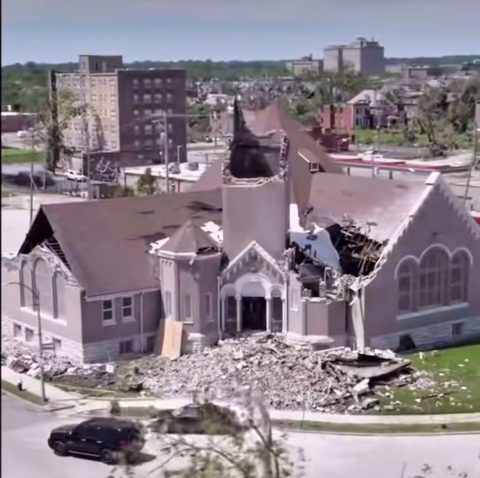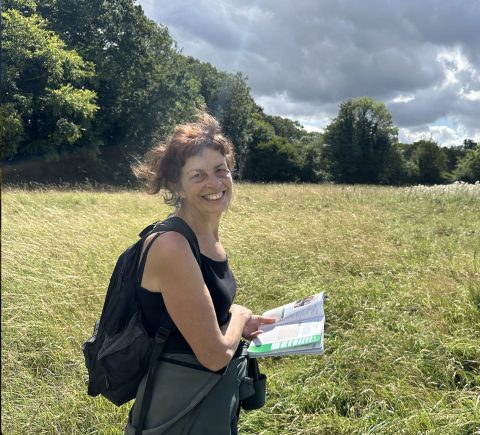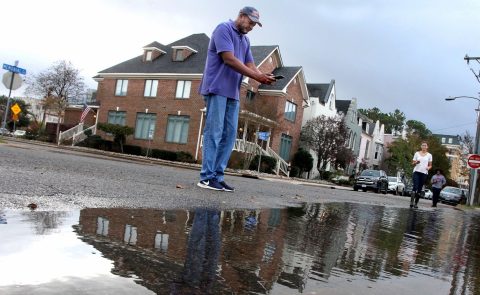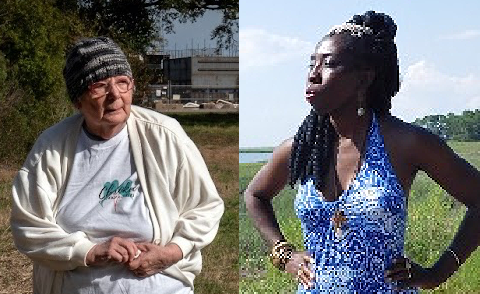

Subscribe to A2 Times (it’s free!)
Newsletters
- View all
- Climate Change
- Community Stories
- Environmental Justice
- Natural Disasters
- Policy and Advocacy
-

Where Systems Fail, We Rise: MCU and Mutual Aid After the Storm
After eight years of creative and energetic leadership, Harriet Festing, co-founder and Executive Director of Anthropocene Alliance (A2), will step down from her role on June 1, 2025, transitioning into a part-time role as Director of Development.
Read more -

Founding Director of Anthropocene Alliance to Step Down
After eight years of creative and energetic leadership, Harriet Festing, co-founder and Executive Director of Anthropocene Alliance (A2), will step down from her role on June 1, 2025, transitioning into a part-time role as Director of Development.
Read more -

“Living Life as a Fifth Grader”: Garry Harris on his Lifelong Path to Leadership
Garry Harris, Founder and Executive Director of the Center for Sustainable Communities, based in both Atlanta, GA, and Hampton Roads, VA, shares his journey from his early interest in the energy field to his career in nuclear engineering, and his mission to mentor black youths.
Read more -

Two Plucky Community-Based Groups Stood Up to the Federal Government – And Won!
A pair of small, community-based organizations, one in Mississippi and the other in South Carolina—members of the national environmental coalition A2—are celebrating victories after court rulings halted manufacturing toxic to their health.
Read more -

The A2 Times
As we begin the new year, we’re proud to announce that A2 now represents 400 climate and environmental justice organizations in all 50 states and five U.S. territories. By this time next year, it will be 500 members, with five or more member communities in most states.
Read more -

Harnessing Our Power
For people in the environmental field, 2024 has been both disturbing and rewarding. Global temperatures set another new record, but green energy infrastructure keeps growing at a rapid pace. Unfortunately, not fast enough to keep up with rising demand. Data centers and crypto mining, with their vast electricity demands, are the latest environmental scourge.
Read more -

Seawall Plan Divides a Community
“I used the ‘f’ word” A visit to Susan Lyons’ backyard in Charleston, S.C., reveals an urban oasis. But looks can be deceiving. “I live in a river,” laments Lyons, about a yard that has frequently flooded in recent years, often overtopping her swimming pool.
Read more -

Trepidatious but Determined
Like everybody else in the environmental field, we hoped the climate-change-denying candidate — a man whose vision of nature is limited to the putting green and sand trap — would be rejected by voters.
Read more -

“It’s Time!” for the Climate Week Roundup
New York City was the center of the universe for all things climate related during Climate Week, September 22-29. And A2 was there!
Read more -

A2 Represented at First-Ever White House Summit on Climate Resilience
The White House hosted its first-ever Summit on Building Climate Resilient Communities, and Anthropocene Alliance was there!
Read more -

They Fought a Multi-Billion Dollar Pipeline – And Won! A Conversation with Jonathan Mingle
In 2024, a coalition of grassroots advocates accomplished the unthinkable: They defeated a multi-billion-dollar energy company attempting to build an interstate methane pipeline. In Gaslight: The Atlantic Coast Pipeline and the Fight for America’s Energy Future, journalist Jonathan Mingle tells the story of the six-year battle between Dominion Energy — one of the U.S.’s most powerful energy companies — and the communities and organizations, stretching from Virginia’s Blue Ridge foothills to the Shenandoah Valley — who challenged it.
Read more -

A2 Group Finds its Voice in Flood-Prone Cicero, Illinois
When Delia Barajas’ group joined A2 last year, they hadn’t even settled on a name yet — just a pressing mission to make their Cicero, IL community a healthier place to live by combatting the toxic industries in their midst.
Read more -

The U.S. Tested Nukes on Its Own People. It’s Time to Apologize and Pay.
Tina Cordova is intimately familiar with the legacy of the atomic bomb. Her hometown, Tularosa, New Mexico, is just thirty-four miles downwind from the Trinity Test Site, where Manhattan Project scientists first detonated what they called “the Gadget.” When both of her great-grandfathers, who were in Tularosa during the blast, succumbed to stomach cancer ten years later, it was just the beginning of her family’s troubles.
Read more -

Weathering the Storm: Surviving the Next Disaster
From wildfires and tornadoes to flooding, severe weather events happen somewhere in the U.S. nearly every day. Climate change has increased their frequency. According to the National Oceanic and Atmospheric Administration’s Center for Environmental Information, weather/climate disaster events this year have resulted in 84 deaths and losses exceeding $1 billion.
Read more -

For A2 environmental groups, Biden’s LNG decision cause for celebration — and caution
For fighters on the frontlines of the battle for environmental justice, the wins can seem few and far between. But environmentalists had reason to celebrate recently when the Biden administration announced a pause on new permits to export liquified natural gas (LNG), pending updates by the Department of Energy (DOE) to its authorization process.
Read more -

In New Mexico, Advocates Demand Clean Air from Intel
Dennis O’Mara was outside the Historic Old San Ysidro Church when Marcy and I arrived. Beyond the church, Intel’s sprawling microprocessor plant overlooked Corrales. “I promise I’ll be good,” Marcy told Dennis.
Read more -

A2 Activist Tells Her Neighbors: “You Are Your Environment!”
Jackie Echols didn’t need another crisis to add to her dossier. As president of the South River Watershed Alliance (SRWA), she was already working hard to clean up a river — almost forgotten by locals — that flows through Fulton, DeKalb, Rockdale and Henry counties in Georgia. South River traverses a mostly low-income African American community and has long been polluted by sewage spills and hemmed in by landfills, truck yards and industrial sites.
Read more -

A2 Members Get Organized in New Orleans
I exited the elevator to the third floor of the New Orleans Healing Center and found Wade Rathke standing outside a locked door.
Read more -

How a Georgia Woman Waded Through Bureaucracy to Help Her Flooded Town
Jacqueline “Jackie” Jones wasn’t looking for a second career when the Tennessee native settled in tiny Reidsville, Georgia, after retiring from crunching numbers for the IRS.
Read more -

In South Dakota’s Black Hills, A Lithium Boom Promises More of the Same from Mining Industry
South Dakota’s Black Hills are no stranger to mining. The hills — sacred land to the Lakota — have long been exploited for gold and uranium deposits, the lands scarred and rivers polluted in the process. The area is a relatively small island of lush trees and rolling hills amid a vast expanse of grasslands, but one in every five acres has an active mining claim. Now, mining companies are eyeing the region for another resource: lithium.
Read more -

A2 Activists Gather to Demand the “Dirty South” Clean Up Its Act
Activists from A2 member organizations recently gathered with other environmental advocates in Washington, D.C., to “talk dirty” about pollution and viable solutions in the American South.
Read more -

A2 closes year with $4.7 million in funding for members!
We’re thrilled to wrap up 2023 with news that 29 members of Anthropocene Alliance were successful in individual and group applications for funding from the National Fish and Wildlife Foundation! Some of the grants were relatively small ($20,000) and some big ($700,000). A2 helped with project design and connecting community leaders to state and federal partners. Staff members Kerri McLean and Molly Vasanthakumar organized more than 100 meetings between leaders and partners. Unbowed, they are already gearing up for next year!
Read more -

Global Warming Hits Home: A2 Members Cope and Resist
Global warming continues to accelerate, just as climate scientists predicted it would. During the two weeks following July 4th, the entire planet was hotter than it’s been in about 125,000 years. As I write, Phoenix is suffering its worst heat wave ever, with 23 days in a row of temperatures at or above 110 degrees F. On Saturday, July 22, the temperature reached a record 118! In El Paso, Texas, temperatures have registered 100 degree for more than a month and counting, again, the longest such spell ever recorded.
Read more -

Talking Environmental Justice with Tennessee Legislator Justin J. Pearson
Anthropocene Alliance has many member-communities whose health and very lives are being sacrificed to benefit some of the wealthiest corporations in the world
Read more -

Communities Rise Up to Resist Becoming “Sacrifice Zones”
The following is a special edition of our newsletter, A2Times, written by Greg Schwartz in response to a NYTimes front page story titled “Living and Breathing on the Frontline of a Toxic Chemical Zone.” The editors of the Times, with an excess of good taste, rejected the term “sacrifice zone” more commonly used by frontline communities and their allies. (The term is however mentioned in the Times story.)
Read more -

Call to Mitigate Flooding by Banning “Fill and Build” Picks Up Steam
A national campaign to ban what’s known as “fill and build” is picking up steam, with Anthropocene Alliance partnering with a coalition of allies to raise awareness about the dangers of this controversial practice. Ostensibly aimed at protecting new homes from flooding by using fill dirt that is graded and packed to elevate building sites, fill and build sheds stormwaters into the lower surrounding homes and communities, making them even more vulnerable to catastrophic flooding.
Read more -

Warehouse Pits Locals Against Developers. At Stake is the South Tacoma Aquifer.
Opposing forces are prepared for battle in South Tacoma. In one corner are environmentalists with a proposal for an economic green zone to generate a more sustainable future. In the other corner are industrialists looking to build one of the largest warehouses in the world that would endanger the South Tacoma aquifer.
Read more -

That Sound You Hear isn’t Dripping Oil, it’s a Ticking Time-Bomb
Oil and gas pipelines continue to leak toxic contamination that threatens communities across the country. The leak of nearly 600,000 gallons of oil from TC Energy’s Keystone pipeline into a creek in Kansas on December 8, 2022 is just the latest example of a long string of such environmental disasters. Roughly 3 million gallons of oil from pipeline accidents are spilled in the U.S. each year.
Read more -

Gulfport Mississippi Group Looking for Justice
Gulfport activists have taken their struggle for environmental justice to the national level, naming the U.S. Department of Transportation and Secretary of Transportation Pete Buttigieg as defendants in a landmark lawsuit intended to halt a potentially disastrous road expansion project. Buttigieg has promoted various environmental justice projects, including the $1 billion Reconnecting Communities program that will disburse federal funding to rectify harm caused by roadways built through lower-income, Black communities after creation of the interstate highway system in the 1950s. Yet at the same time, US DOT has made a federal grant for a road expansion project in Mississippi that activists say will harm such communities.
Read more -

A Year of Support for Frontline Communities
2022 was a remarkable year for environmental justice. It wasn’t just because of the big increase in federal funding, but because so many people in the government and nonprofit sectors worked hard to direct the new money to frontline communities who needed it most. Anthropocene Alliance and its partners were among them.
Read more -

Will Diablo Canyon Nuclear Power Plant Become the Next Fukushima?
Environmental groups concerned about cost and safety issues at the Diablo Canyon nuclear plant in San Luis Obispo County
Read more -

Island-Wide Blackout Confirms the Failure of LUMA, the Newly Privatized Electric Utility in Puerto Rico
More than a week after a hurricane hit the American territory of Puerto Rico, 750,000 customers are still lacking service. The reason is not only the hurricane’s wind and rain: though it packed a lot of precipitation, Fiona was a relatively weak, Category One storm. The primary culprit is the island’s system of privatized electricity, which values profits over service. LUMA Energy, which took over operation of the territorial electricity grid 18 months ago, has failed to make the investments necessary to avoid a repeat of what happened after Hurricane Maria in 2017. That disaster sticks in mainland memory due to an embarrassing video of President Trump coming to the rescue of desperate people by tossing them rolls of paper towels.
Read more -

End-Times: a Visit to Isle de Jean Charles, Louisiana
An easy trip I left Thibodaux, Louisiana at 9 a.m. on July 27, 2022. An hour later, I arrived at Isle de Jean Charles where I had a vision of the world a hundred years in the future.
Read more -

Joe Manchin as Alibi
Devil Incarnate Certain things we can stipulate: 1) That the senator from West Virginia is corrupt and a liar. He makes no bones about voting to support the industry that gave him his fortune; and he has broken multiple promises to his colleagues that he would, in the end, support Biden’s signature initiative, Build Back Better. 2) That Manchin’s refusal to support any climate change legislation in BBB is the height of irresponsibility.
Read more -

The Supreme Court’s War on Justice
The decision last Friday by the U.S. Supreme Court to reverse Roe v. Wade is a serious setback for human rights and the rule of law. Combined with the Court’s overturning on Thursday of New York City’s 100-year-old handgun ordinance, and its earlier rulings undermining Miranda rights and secular education, it’s clear that a partisan court, untethered from history and legal precedent, has chosen to wage war against both justice and democracy. These are the kinds of rulings that occur in courts in “illiberal” states like Hungary and Poland, or formerly fascist ones. Proposed legislation in Missouri, Texas, and Louisiana, intended to impose long prison sentence on abortion providers, and even to punish friends and family who help women obtain out-of-state abortions, harken back to similar laws in Nazi Germany.
Read more -

Community Leaders Extend a Lifeline
Everybody knows that disasters – including hurricanes and floods, heat waves and fires – cause tremendous hardship. What’s less well known is that disasters generally strike people already experiencing hardship. That’s because it’s the poor and the marginalized who tend to live in areas most vulnerable to calamity. In response, community leaders belonging to Anthropocene Alliance have spearheaded the establishment of a Mutual Aid Fund to provide fast, compassionate support for communities in crisis.
Read more -

An Accidental Activist in New Orleans’ Lower 9th Ward
In 2005, she was a divorced, single mom living in the Lower 9th Ward of New Orleans. “I had an autistic son and a full-time job,” she said. “My mother helped me, but I didn’t have time for anything more than work and family. Or so I thought.”
Read more -

For Many in Harm’s Way, the Costs of Relocation Are Too Great
Last year was the sixth hottest on record, and ocean temperatures were the highest ever recorded. In the U.S., wildfires blazed across the drought-stricken West, hurricanes deluged the Northeast, floodwaters flashed through Tennessee, and Colorado River water levels dropped dangerously low. Much of this is attributable to climate change. According to the National Oceanic and Atmospheric Administration, 2021 was one of the most destructive and expensive years in American history. The total cost in dollars was some $145 billion. Over the next 50 years, more than thirty million Americans will be displaced due to climate change.
Read more -

Toast
This special issue of the Anthropocene Alliance Newsletter is dedicated to a single artwork by Sue Coe. Sue has been a good friend of Anthropocene Alliance from the beginning, offering advice and moral support when we first launched, and providing artworks to illustrate some of our blogs and stories. Her art is found in the permanent collections of many of the most famous museums in the world. She had a retrospective at The Museum of Modern Art in New York City in 2018 and her work has been featured in The New York Times, The Nation, and dozens of other newspapers and magazines.
Read more -

A New Initiative Helps Flooded Communities Get Federal Aid
From her front porch in the Montrose neighborhood of Port Arthur, TX, Beatrice Sanders has seen a lot. On marshland once used for farming, Montrose developed into a close-knit community, providing two generations of African American families a pleasant and peaceful life. Street names echo families who lived, and still live there. Residents support their neighbors and their vulnerable community, despite daunting challenges.
Read more -

“Tell FEMA!”
In 1993, Terri Straka bought what she called her “forever home” in the Rosewood neighborhood of Socastee, SC, near Myrtle Beach.
Read more -

A River with Rights
Tar Creek is a branch of the Neosho River that flows through Miami, Oklahoma. Along its banks, families once picnicked, children played, and homes sprang up.
Read more